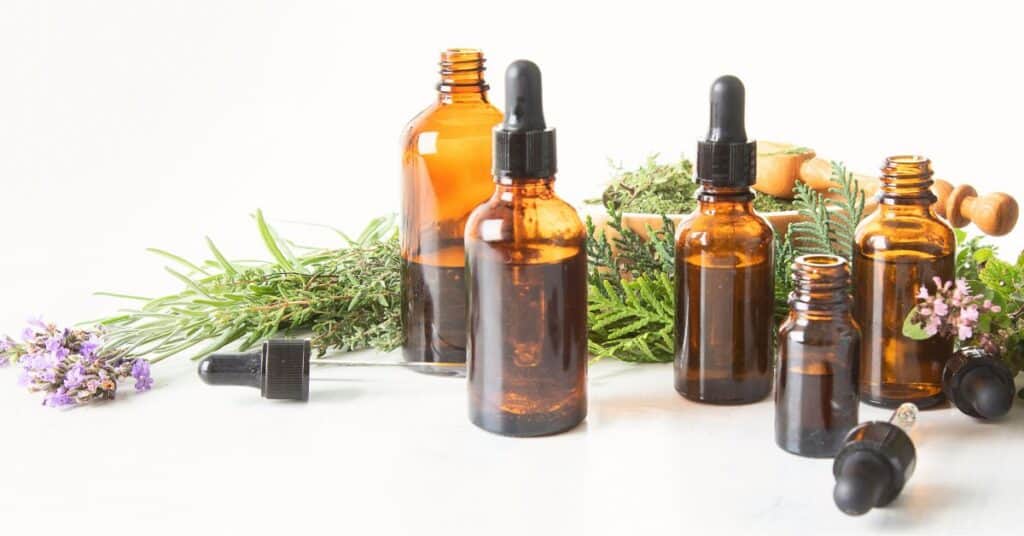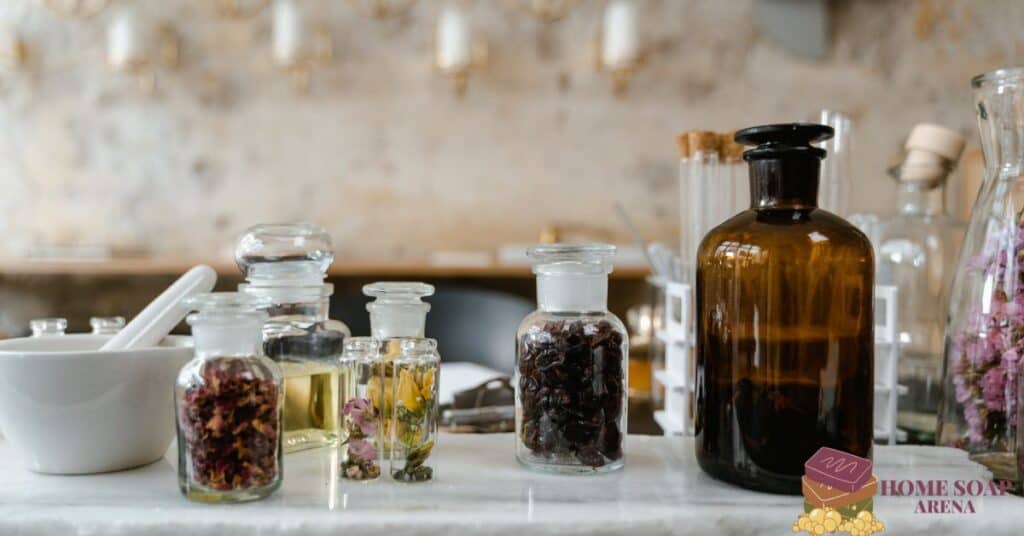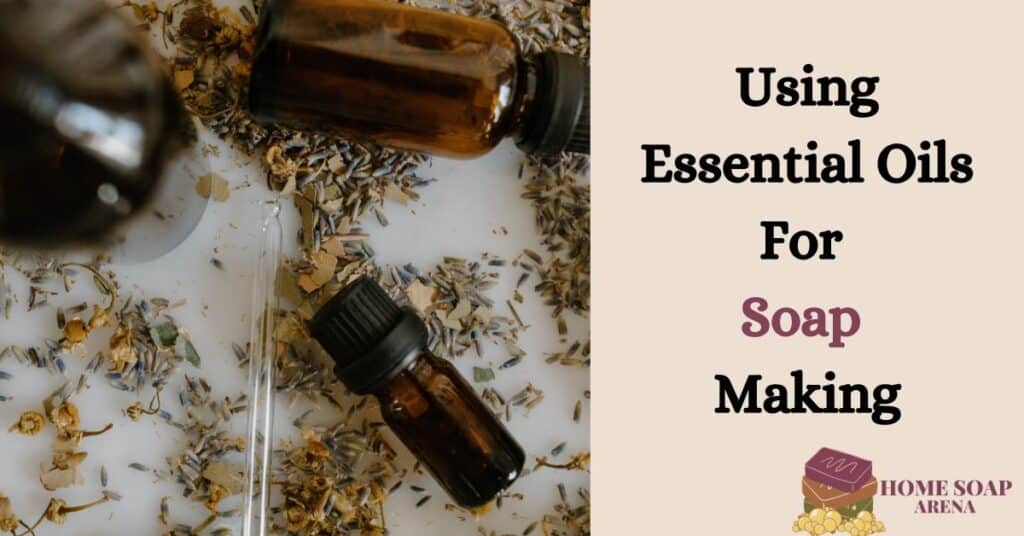Table of Contents
- Why Is Scent Important In Soap?
- Difference Between Essential Oils And Fragrance Oils
- Essential Oils vs. Fragrance Oils in Soap Making
- What Essential Oils Go Well Together In Soap?
- Conclusion
Are there differences between essential and fragrance oils? Yes! That’s what I will tell you in this blog post.
Essential and fragrance oils are often mistaken for one another, but there is a significant distinction between the two.
As a soap maker, I adore aromatherapy, perfumery, scented products, and amazingly scented soap.
Essential oils are extracted directly from plants, usually through steam distillation.
In contrast, fragrance oils are a mixture of synthetic chemicals designed to mimic the natural smells of plants or other substances.
Why Is Scent Important In Soap?
Scent can influence consumers’ buying decisions, affect their emotions, and enhance their enjoyment of using soap.
Scent can attract customers and make them loyal to a brand. Best essential oils brands.
A report by Mintel, a market research firm, found that 67% of European respondents cited scent as one of the most critical factors influencing them to buy liquid soap products.
Similarly, 47% of respondents in the United States decided to buy shampoo or conditioner products based on their aroma.
This shows that scent can be a powerful marketing tool for soap makers, as it can create a distinctive identity and appeal for their products.
Scent can also affect the mood and emotions of the users.
A study by the Social Issues Research Centre, a research organization, stated that certain fragrances can trigger different sensations and feelings in users, depending on their preferences and associations.
For example, some scents can make people feel relaxed, energized, happy, or romantic.
The positive emotions that result from pleasant aromas can also influence the ratings and attractiveness of the products.
Therefore, scent can enhance the user experience and satisfaction of using soap.
Scent can also complement the other functions and benefits of soap.
For example, some scents, such as tea tree, lavender, or peppermint, can have antibacterial, antifungal, or anti-inflammatory properties.
These scents can help fight infections, soothe irritations, or heal wounds.
Some scents, like honey, oatmeal, or almond, can moisturize, nourish, or exfoliate the skin.
These scents help improve the skin condition and appearance And make the soap smell fresh and clean.
Some scents can also mask the unpleasant odors from the other ingredients or the environment, such as citrus, rose, or vanilla.
It is also essential to use the right type and amount of scent for soap making, as some scents can cause problems such as overheating, accelerating, seizing, or ricing.
Difference Between Essential Oils And Fragrance Oils
Essential oils
First, know that Essential oils are volatile compounds extracted from various parts of plants, such as flowers, leaves, bark, and roots.
They are highly concentrated and can be used for various purposes, including aromatherapy, skincare, medicine, and cleaning.
There are many essential oils, each with unique therapeutic properties and fragrance profiles. Lavender, Eucalyptus, Peppermint
Essential oils are extracted directly from plants and herbs through steam distillation, cold pressing, or solvent extraction.
They contain the natural volatile compounds found in plants, such as terpenes,
aldehydes, esters, and alcohols give each oil its characteristic fragrance and therapeutic properties.
Aromatherapy, natural therapies, and personal care products often use essential
Oils due to their highly concentrated and pure nature, which only requires small amounts to be effective.
Fragrance Oils
Fragrance oils, also known as concentrated fragrances, are synthetic fragrances that imitate the aroma of plants or other materials.
They are often used to scent cleaning products, cosmetics, and perfumes, as well as in electric diffusers and other room scenting products.
Although Fragrance oils can be used for therapeutic purposes, they do not have the same medicinal properties as natural essential oils.
Fragrance oils are generally produced synthetically in the laboratory from
combinations of chemicals and artificial fragrances, often inspired by the fragrances of essential oils.
Therefore, fragrance oils are much cheaper than essential oils but do not contain the therapeutic properties or health benefits of essential oils.
They are often used in perfumes, cleaning and personal care products, and electric diffusers.
Essential Oils vs. Fragrance Oils in Soap Making
Essential and fragrance oils are used to add scent to soap, but they have different properties, benefits, and drawbacks.
Essential oils are natural extracts of plants, while fragrance oils are synthetic blends of natural and artificial ingredients.
Essential oils may have therapeutic effects on the skin and the mind, while fragrance oils are mainly used for cosmetic purposes.
Essential oils are more expensive than fragrance oils, especially for rare or exotic plants like jasmine or rose.
Essential oils are listed by their scientific names on cosmetic labels, while fragrance oils are listed as “parfum” or “fragrance.”
Essential and fragrance oils have different usage rates and safety guidelines for soap making.
Essential Oils are Limited to the scents found in nature. Examples include lavender, eucalyptus, or citrus oils.
Each essential oil carries a unique and complex fragrance profile due to the natural compounds present.
Fragrance Oils Offers a broad spectrum of scents, including those that may not exist in nature.
Examples range from exotic blends to seasonal or thematic aromas.
Fragrance oils can achieve highly complex and consistent scent profiles, providing versatility for soap makers.
Fragrance oils are formulated for stability, offering a consistent scent that lasts longer. They are less prone to degradation due to external factors.
Essential oils can be sensitive to heat and light, potentially leading to a shorter shelf life and a reduction in scent intensity over time.
Some soap makers prefer to use only essential oils for their natural and holistic benefits, while others like experimenting with fragrance oils for their variety and consistency.
Some also like mixing essential and fragrance oils to create unique scents and combinations.
The choice depends on personal preference, budget, and availability of ingredients.
What Essential Oils Go Well Together In Soap?
Many essential oils go well together in soap, depending on the desired scent and properties. Some common combinations are:
Lavender and geranium: This floral and soothing blend can help calm the mind and skin.
Lavender essential oil is versatile and can pair well with many other oils.
Geranium essential oil has a sweet and rosy aroma that can balance the skin and uplift the mood.
Lemon, lemongrass, and ginger: This refreshing and energizing blend can stimulate the senses and invigorate the body.
Lemon essential oil has a bright and citrusy scent that cleans and purifies skin.
Lemongrass essential oil has a lemony and herbaceous aroma that can act as a natural deodorant and insect repellent.
Ginger essential oil has a warm and spicy scent that can improve circulation and ease muscle tension.
Orange, cedarwood, and patchouli: This is a warm and earthy blend that can create a cozy and relaxing atmosphere.
Orange essential oil has a sweet and fruity scent that can boost the mood and reduce stress.
Cedarwood essential oil has a woody and balsamic aroma that can ground and stabilize emotions.
Patchouli essential oil has a rich and musky scent that can enhance the skin and soothe the nerves.
Florals: Lavender, Ylang Ylang, Geranium, Melissa, Jasmine, Cistus
Citrus: Lemon, Lime, Orange, Tangerine, Grapefruit, Citrus Fresh, Lemon Myrtle, Jade Lemon, Bergamot Mint
Peppermint, Spearmint
Herbs: Rosemary, Marjoram, Basil, Thyme, Dill, Ginger, Sage, Tea Tree, Thieves
When blending essential oils during soapmaking, a good guideline is approximately 30% top notes, 50% middle notes, and 20% base notes.
Conclusion
Whether derived from the natural purity of essential oils or the artful craftsmanship of fragrance oils, the scents in soap enhance the overall sensory experience.
The choice between essential oils and fragrance oils often depends on personal preferences, the desired scent profile, and the intended purpose of the soap.



